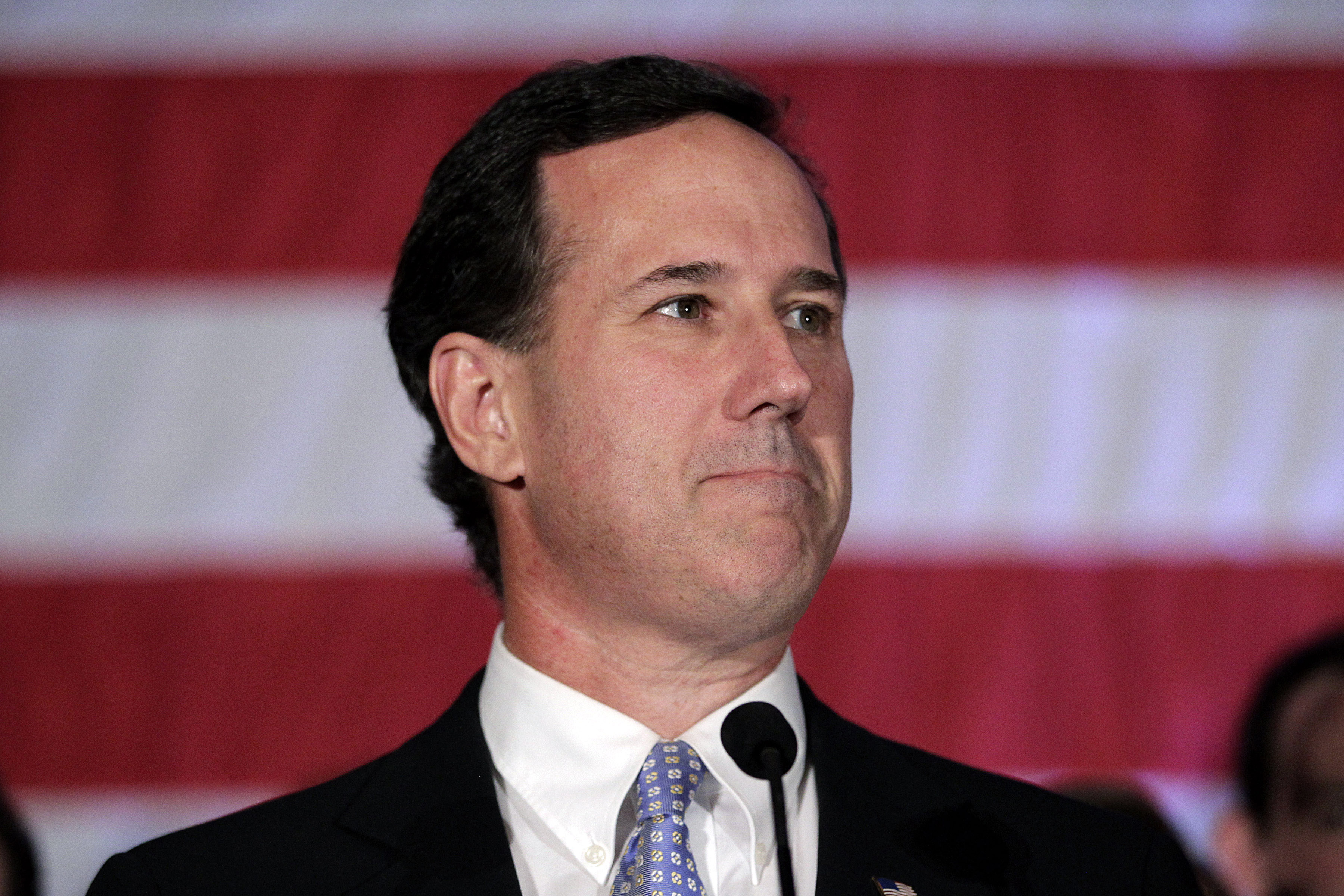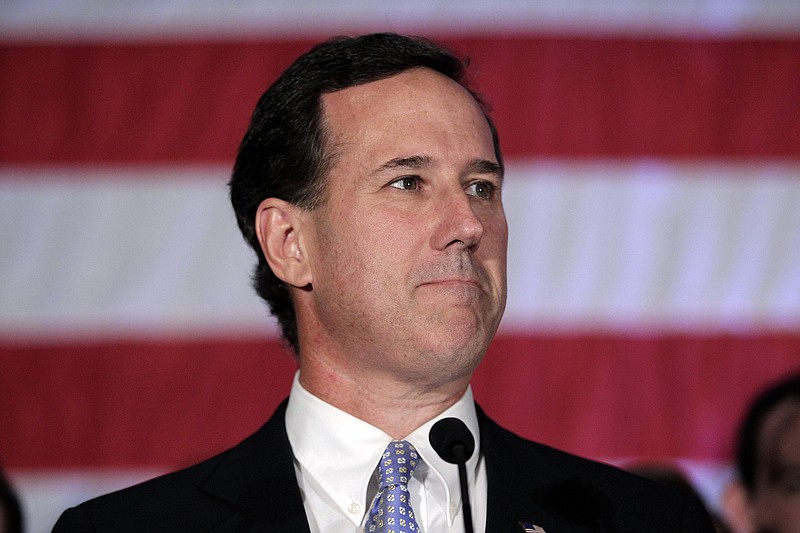 In this April 3, 2012, file photo, Republican presidential candidate, former Pennsylvania Sen. Rick Santorum speaks during a primary election night party in Cranberry, Pa. Rick Santorum is as unpopular in Pennsylvania today as he was six years ago, when home-state voters kicked him out of the Senate in a rout. That sour public perception may doom his fading chances of sticking around in the GOP presidential race, along with other hurdles that dot his path to a possible, and needed, victory in the April 24 primary. (AP Photo/Jae C. Hong, File)
In this April 3, 2012, file photo, Republican presidential candidate, former Pennsylvania Sen. Rick Santorum speaks during a primary election night party in Cranberry, Pa. Rick Santorum is as unpopular in Pennsylvania today as he was six years ago, when home-state voters kicked him out of the Senate in a rout. That sour public perception may doom his fading chances of sticking around in the GOP presidential race, along with other hurdles that dot his path to a possible, and needed, victory in the April 24 primary. (AP Photo/Jae C. Hong, File)MARC LEVY, Associated Press
GETTYSBURG, Pa. (AP) - Rick Santorum is as unpopular in Pennsylvania today as he was six years ago when home-state voters kicked him out of the Senate in a rout. That sour public perception may doom his fading chances of sticking around in the GOP presidential race, along with other hurdles that dot his path to a possible, and needed, victory in the April 24 primary.
He failed to heal a rift with fiscal conservatives who had lost confidence in him or reassure party leaders that he could temper his hard-line positions on social issues that repel the moderate and independent voters who are crucial to success in statewide elections in this diverse state. Even some who know Santorum say flat out he isn't the best candidate.
The former senator also faces a nearly insurmountable hurdle to stop Mitt Romney, who emerged as the nominee-in-waiting after his sweep of contests this week in Wisconsin, Maryland and Washington, D.C.
None of that seems to be deterring Santorum.
"People in Pennsylvania know me," he said this week while campaigning at a Pittsburgh-area diner. "We've got a strong base of support here, and we're going to work very, very hard."
That Pennsylvanians know Santorum may be part of the problem.
He spoke at the state's largest annual gathering of conservatives several weeks ago, yet won a straw vote with less than half the vote. His support in the state also has slipped, according to surveys that highlight his apparent likeability problem.
A February poll by Muhlenberg College showed that nearly half the registered voters surveyed viewed him unfavorably. Just 39 percent saw him favorably.
A March 28 poll by Franklin & Marshall College showed Santorum with 30 percent support to Romney's 28 percent among registered Republicans, a significant drop from the 29-point advantage Santorum enjoyed in February.
In 2006, with Democrat Bob Casey comfortably ahead, Santorum met with apprehensive conservative activists who wanted him to explain his enthusiastic support for moderate Republican Sen. Arlen Specter over rising conservative star Pat Toomey in the primary election two years earlier. The activists also sought Santorum's rationale for supporting targeted federal spending, or "earmarks," and other fiscal positions they deemed irresponsible.
Santorum, who was his usual combative self and came across as anything but apologetic, argued that his positions should be balanced against everything he'd done throughout his 16 years in the House and Senate.
"The implication was clear that, 'You guys have no choice. There is no other conservative in Pennsylvania, no other viable conservative,'" said Bob Guzzardi, a real estate investor and conservative activist from suburban Philadelphia who said he confronted Santorum at the meeting.
Said Ryan Shafik, a Harrisburg-based Republican campaign strategist: "It basically turned into a hostile meeting and Santorum never acknowledged wrongdoing. ... After that meeting, most of those people came away not helping him. They're not going to go door to door for him after the way he treated them."
Santorum has said he endorsed Specter because Specter agreed to support conservatives nominated to the Supreme Court by President George W. Bush. Specter, however, has said he never made - and never would have made - such a promise.
The sour feelings toward Santorum are also evident in his lack of endorsements from the state GOP establishment. Toomey, who won Specter's seat in 2010, Gov. Tom Corbett, Lt. Gov. Jim Cawley and state party chairman Rob Gleason all are publicly uncommitted. Former Govs. Tom Ridge and Mark Schweiker, four congressmen and GOP national committeeman Bob Asher, are backing Romney.
Even some who know Santorum well say he isn't the best candidate for the times.
"It's fairly clear Mitt Romney is a much better candidate than Rick Santorum to attract swing voters in a year like this," said former Rep. Phil English, a Romney supporter who campaigned with Santorum in 2006.
Santorum lost that election to Casey by 18 percentage points. His defeat has been attributed in part to the anti-war, anti-Bush mood that took hold in 2006 and in part to a blunt personal style that his constituents didn't always appreciate. Santorum didn't back down from his support for Bush or the war.
"I've been there, I've stood with him and I've gone down with the ship," said English, now a Washington-based lobbyist.
Supporters such as trucking contractor Marlin Schnupp, who showed up to see Santorum at a rally last month in Gettysburg, sees past the criticism that Santorum can't appeal to moderates.
"Maybe they're right, but it doesn't change what I think," said Schnupp, 64, who views Santorum as the only candidate who is honest. "If it meant we lost the national election, I'd still support him."
Romney has more than half of the 1,144 delegates needed to win the nomination, more than twice Santorum's total, according to the latest tally by The Associated Press. Santorum would need to win 80 percent of the remaining delegates to clinch the nomination before the GOP's national convention in August.
Santorum is helped some by the fact that Romney is struggling with his image in Pennsylvania, too. The Franklin & Marshall poll found Romney and Santorum with nearly identical unfavorable ratings, 25 percent and 26 percent, respectively.
But Santorum is under more pressure to win Pennsylvania.
"It would be the ultimate black eye to his campaign to lose his home state and really diminish his argument that he can take to the convention that he is an electable candidate" in November, said Muhlenberg College pollster Christopher Borick.
